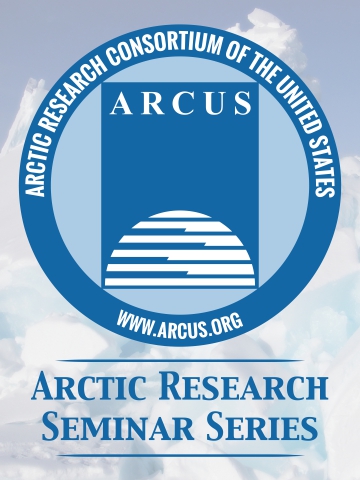Speaker: Anna Liljedahl, University of Alaska Fairbanks

The Arctic Research Consortium of the U.S. (ARCUS) announces the next Arctic Research Seminar featuring Anna Liljedahl, Research Associate Professor at the University of Alaska Fairbanks (UAF). This event will be held online via Zoom.
Registration is required for this event.
The ARCUS Arctic Research Seminar Series invites leading Arctic researchers and community leaders to share the latest findings in Arctic research and what they mean for decision-making. The events are free and open to the public, and will be of particular interest to interest to the international Arctic research community, federal agency officials, congressional staff, non-governmental organizations, Arctic educators, and the public.
This seminar, titled Permafrost Hydrology Discoveries and Opportunities, will be presented by Anna Liljedahl, University of Alaska Fairbanks. Growing up in northern Sweden, Anna enjoyed playing with the abundant meltwater flowing behind the small family farm in spring. At UAF she researched the controls and fate of water under a changing Arctic climate through collaborations in field measurements, numerical modeling, remote sensing, and, in the coming years, big data cyberinfrastructure.
Seminar Abstract:
Arctic and sub-Arctic field measurements are showing warming and thawing permafrost, increasing winter runoff, and groundwater levels. Local scale remote sensing analyses reveal degrading ice wedges, thermokarsts, and retrogressive thaw slumps, and watershed-scale numerical modeling results suggest micro-topographical geomorphological controls on fluxes and stores of water as ice-rich ground thaws and subsides. We are living in a time of rapid change to the permafrost-affected landscape across the Arctic region, with dramatic changes occurring over just a few years. Yet, our understanding of the spatial continuity of change is limited due to the logistical constraints in doing fieldwork in a remote region, under-harnessed high performance and image processing resources, and the coarse resolution of pan-Arctic models. Collaboration across disciplines and organizations allow for a holistic approach in quantifying change, understanding underlying mechanisms, and in encouraging knowledge-generation beyond the scientific community. If successful, one’s weakness becomes the other’s strength and the sum larger than its parts.
Instructions for accessing the webinar will be sent to registrants prior to the event.
